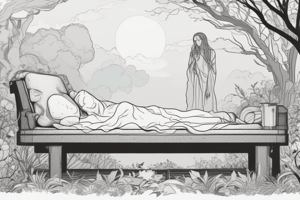Podcast
Questions and Answers
What is the primary characteristic of Acute Mourning?
What is the primary characteristic of Acute Mourning?
- It is a prolonged grieving period
- It is a stage of mourning marked by feelings of sadness and despair
- It is a complex and intense grieving response with feelings of guilt
- It is the initial, intense grieving period following a loss (correct)
What is the primary function of Social Support in the mourning process?
What is the primary function of Social Support in the mourning process?
- To facilitate the process of denial and shock
- To negotiate with a higher power to undo the loss
- To provide a sense of guilt and anger
- To offer emotional support and comfort (correct)
Which stage of mourning is characterized by feelings of numbness and disbelieve?
Which stage of mourning is characterized by feelings of numbness and disbelieve?
- Depression and Sadness
- Shock and Denial (correct)
- Acceptance and Reconstruction
- Anger and Bargaining
What is the primary characteristic of Complicated Mourning?
What is the primary characteristic of Complicated Mourning?
What is the primary function of Rituals and Traditions in the mourning process?
What is the primary function of Rituals and Traditions in the mourning process?
What is the final stage of mourning, marked by acceptance of the loss and the beginning of rebuilding one's life?
What is the final stage of mourning, marked by acceptance of the loss and the beginning of rebuilding one's life?
What triggers the body's automatic response to a perceived threat or stressor?
What triggers the body's automatic response to a perceived threat or stressor?
What is the primary function of the hypothalamic-pituitary-adrenal (HPA) axis?
What is the primary function of the hypothalamic-pituitary-adrenal (HPA) axis?
What is a characteristic of the acute stress response?
What is a characteristic of the acute stress response?
What is a physiological change that occurs during the stress response?
What is a physiological change that occurs during the stress response?
What is a psychological change that occurs during the stress response?
What is a psychological change that occurs during the stress response?
What is a type of stress response that occurs in response to a persistent stressor?
What is a type of stress response that occurs in response to a persistent stressor?
Flashcards are hidden until you start studying
Study Notes
Mourning
- Definition: Mourning is the process of coping with the loss of a loved one, including the emotional, social, and cultural responses to death.
- Types of Mourning:
- Acute Mourning: The initial, intense grieving period following a loss.
- Chronic Mourning: Prolonged and intense grieving that can last for months or even years.
- Complicated Mourning: A complex and intense grieving response that can be accompanied by feelings of guilt, anger, or anxiety.
- Stages of Mourning:
- Shock and Denial: The initial response to news of a loss, characterized by feelings of numbness and disbelieve.
- Anger and Bargaining: The second stage, marked by feelings of anger, frustration, and attempts to negotiate with a higher power to undo the loss.
- Depression and Sadness: The third stage, characterized by feelings of sadness, despair, and hopelessness.
- Acceptance and Reconstruction: The final stage, marked by acceptance of the loss and the beginning of rebuilding one's life.
- Cultural and Social Influences:
- Rituals and Traditions: Different cultures and societies have unique mourning rituals and traditions, such as funerals, wakes, and memorial services.
- Social Support: The role of family, friends, and community in providing emotional support and comfort during the mourning process.
- Grief and Mourning Across Cultures: Mourning practices and beliefs vary widely across cultures, with some cultures emphasizing emotional expression and others emphasizing restraint.
- Psychological and Emotional Aspects:
- Grief Work: The process of actively working through one's emotions and coming to terms with the loss.
- Emotional Regulation: The ability to manage and regulate one's emotions during the mourning process.
- Complicated Grief: A prolonged and intense grieving response that can be accompanied by feelings of guilt, anger, or anxiety.
- Disenfranchised Grief: The experience of grief that is not recognized or validated by others, such as the loss of a pet or a non-traditional relationship.
Studying That Suits You
Use AI to generate personalized quizzes and flashcards to suit your learning preferences.



